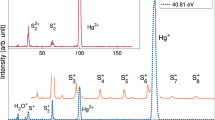Abstract
THE absorption spectrum of S2 vapour shows two regions of predissociation (marked by the diffuseness of the bands) which are known to extend over a considerable spectral range, including several bands belonging to different vibrational states. Using, however, an extremely low vapour pressure of sulphur—this may be obtained experimentally by heating carbon disulphide vapour in the absorbing cell up to about 500° C.—the previously diffuse bands appear sharp, with the exception of one band ( = 0, = 16) which is situated nearest to the predissociation limit and remains quite diffuse. (The spectrum extends only over a limited range; for this reason the first predissociation limit could not be observed.) The next following band ( = 0, = 17) shows a broad but well developed rotational fine structure.
This is a preview of subscription content, access via your institution
Access options
Subscribe to this journal
Receive 51 print issues and online access
$199.00 per year
only $3.90 per issue
Buy this article
- Purchase on Springer Link
- Instant access to full article PDF
Prices may be subject to local taxes which are calculated during checkout
Similar content being viewed by others
References
Kornfeld and Weegmann, Z. Electrochem., 36, 789 (1930).
Asundi, NATURE, 127, 93 (1931).
Author information
Authors and Affiliations
Rights and permissions
About this article
Cite this article
LOCHTE-HOLTGREVEN, W. Pressure Effect on Predissociation. Nature 137, 187–188 (1936). https://doi.org/10.1038/137187b0
Published:
Issue Date:
DOI: https://doi.org/10.1038/137187b0
Comments
By submitting a comment you agree to abide by our Terms and Community Guidelines. If you find something abusive or that does not comply with our terms or guidelines please flag it as inappropriate.



